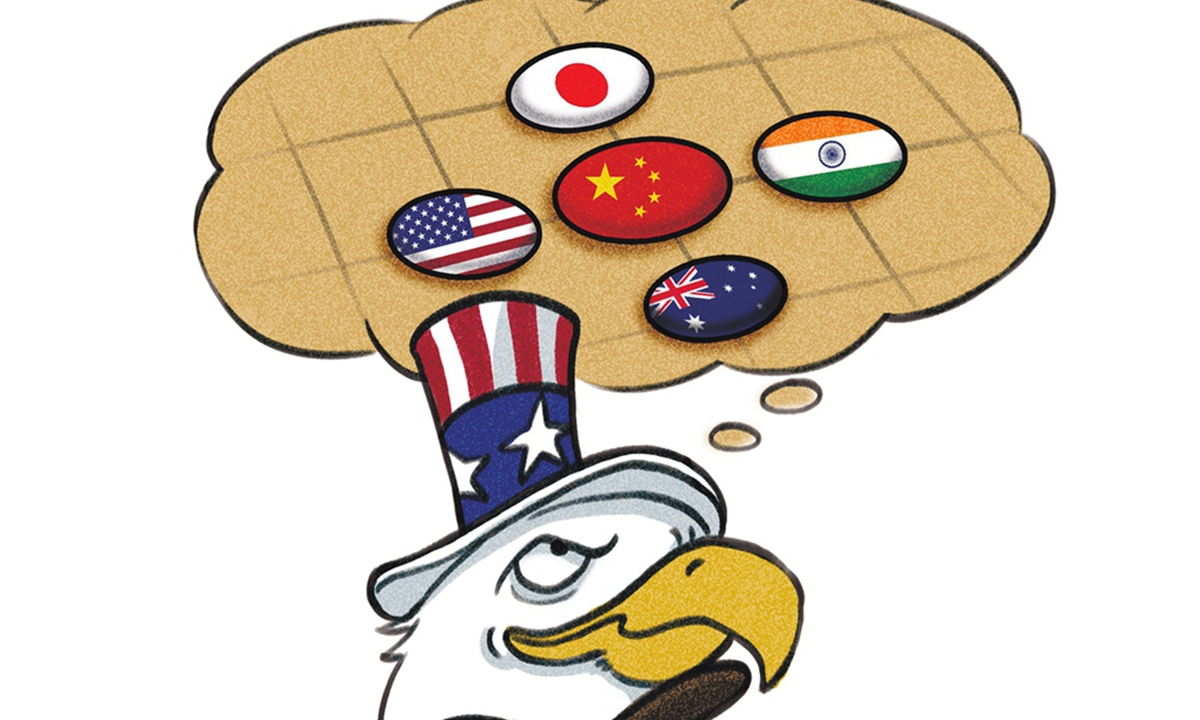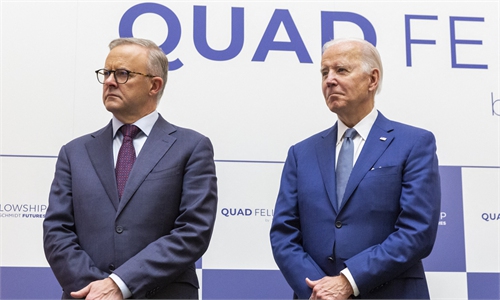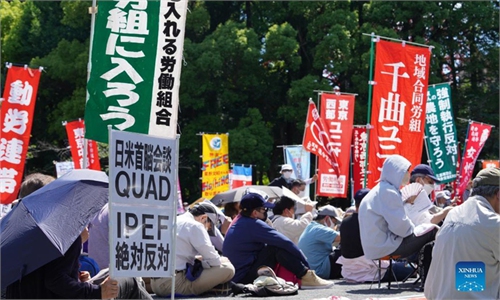
Illustration: Liu Rui/GT
A key part of US President Joe Biden's Asia tour is the so-called Quad leaders' summit in Tokyo on Tuesday. The informal forum comprising the US, Japan, India and Australia is widely seen as an "effort to contain China." If people want to put a big question mark on the "Indo-Pacific Economic Framework" that Biden just launched, then they will describe the Quad which has been in operation for years with an exclamation mark.When Quad held its first summit in Washington last September, Global Times called it a "sinister gang of Indo-Pacific to contain China." More than half a year has passed. The Tokyo summit of Quad has seen some obvious changes at the tactical level, but the international community's impression, judgment and definition of the group remain unchanged.
Compared with the Washington summit in September, there seems to be nothing out-of-line in this summit's joint statement except for issuing some specific measures. It didn't talk about the Taiwan question as the outside world expected, but focused on topics such as infrastructure construction, climate change, the pandemic fight and supply chains. Some comments even said that Quad seems to have shifted from a security architecture to an economic one, no longer engaging in building the so-called "small Asian NATO."
But this is just a smokescreen. The joint statement released after the summit said that "We strongly oppose any coercive, provocative or unilateral actions that seek to change the status quo and increase tensions in the area." The actions include "the militarization of disputed features, the dangerous use of coast guard vessels and maritime militia, and efforts to disrupt other countries' offshore resource exploitation activities." All these are accusations that Washington has spared no effort to make on China.
In addition to these tactical "jargon," the Tokyo summit also came up with "sinister tricks."For instance, the summit launched a so-called Indo-Pacific Partnership for Maritime Domain Awareness, claiming to focus on combating illegal fishing. Coincidentally, countries such as the US and Japan have repeatedly fabricated China's "illegal fishing" in distant seas. At the just-concluded US-ASEAN special summit, Washington's largest investment in the ASEAN region also went to "illegal fishing." Using a confusing "public opinion war" to provoke relations between China and Asia-Pacific countries is indeed insidious.
Washington claims that it "does not seek confrontation with China," but it has perfected its ability to say one thing but do another. In the past few years, Washington and its allies have publicly advocated the "China threat," but more and more countries have found that the real "threat" is not China, but the countries that are trying to turn the Asia-Pacific into different camps, turn it into NATO and drag it into another Cold War. As a result, Washington and Tokyo wanted to take the "curves" and pretended to use various "cooperation" as bait. Some US media commented that this was an intention to encircle China in terms of economy.
The joint statement of Tokyo summit pledged that Quad will seek to extend more than $50 billion in infrastructure assistance and investment in the Indo-Pacific over the next five years. The Quad Fellowship was launched which will bring students from Quad countries to the US each year. It would be good if all these could be implemented. But people cannot stop asking: If the US, which claims itself an Indo-Pacific country, really wants to play a constructive role, why not do it through mature mechanisms such as APEC? Washington's "big deal" is essentially to create a US-led "small circle" to hedge and disintegrate the existing development-centered Asia-Pacific cooperation mechanisms and ultimately make the Asia-Pacific region serve US interests.
The Asia-Pacific is the most dynamic region in the world, and the fundamental reason lies in that the majority regional countries insist on real multilateralism, insist on cooperation and win-win and oppose zero-sum confrontation. The IPEF that the US launched has roped in 12 founding member countries besides the US itself. But people have to ask, without the US opening its market to the other 12 countries and not lowering tariffs for each other, what's the benefit of this deal? How many Asia-Pacific countries are willing to confront China on security and decouple from China on economy?
The first sentence of the joint statement said to "renew our steadfast commitment to a free and open Indo-Pacific that is inclusive and resilient." However, when compared to the real intention of the Quad, it is almost an insult to these beautiful words. Washington needs to and is good at using them to package and conceal its geopolitical selfishness.
Washington has launched quite a few "strategies" and "dialogues" in recent years. But most of them either went nowhere during the partisan changes, or the US withdrew and gave them up. The reason is that it always wants to fool other countries to be "cannon fodder" of its hegemony. At the same time, it tries to wrangle with the trend of the time but that efforts always end in vain.



